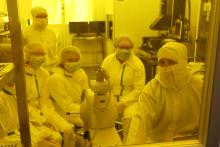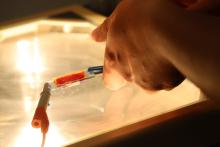84 schoolchildren will take part in the study orientation offer during the 2023 summer vacation. During the projects, which last several days, the participants can take a look over the shoulders of researchers, exchange ideas with students and get a feel for whether their intended course of study suits them.

"We want to show prospective students how they can make the world a little bit better by studying natural sciences, geosciences or engineering at TU Bergakademie Freiberg," explains student advisor Maike Baudach. "During the taster days, the students take part in experiments, make contact with students and lecturers, and visit companies from the relevant sector. This gives them a practical insight into future topics from their studies as well as possible career fields."
From Spaceship Earth to High-Tech Metals to the Circular Economy
The geo-week "Spaceship Earth" got underway, during which the students gained insights into many fields of work and research of the geoscientific courses of study- in the laboratory, in the mine and on an excursion with researchers. They examined diamonds, shone a light through minerals or clarified how groundwater flows under the earth.
At the Management Camp, participants tested the study of economics. They asked what decisions are made every day in a company or why some companies are more successful than others. They also learned about innovative teaching formats with gaming apps, virtual reality glasses or business games.
In the second week on the topic of "Fascination Geoengineering," the students lent a hand themselves in the rock and soil mechanics labs and while measuring the earth's surface.
The participants of the BioNanoTec week studied the applied natural science course on a trial basis. Four days of scientific program provided insights into life sciences and physics.
Impressions from the BioNanoTec week
For the seventh time, the BioNanoTec Week took place at the Faculty of Chemistry and Physics of TU Bergakademie Freiberg from July 17-21, 2023. In total, the 18 registered students:inside from Berlin, Brandenburg, Saxony and Greece were able to gain insights into the life sciences and physics and learn about the course of study "Applied Natural Science".
The week began with an introductory lecture to the university by the scientific organizer of the BioNanoTec Week Dr. Tilmann Leisegang and Dirk Damaschke from the public relations department, a subsequent campus tour and a visit to the terra mineralia. Four days of scientific program then followed. The lecture series was opened by Prof. Jens Kortus (Institute of Theoretical Physics), who presented the fascinating world of quantum mechanics in his lecture with impressive experiments. The lecture series was continued by two lecturers from the Institute of Life Sciences. Dr. Michel Oelschlägel (Microbiology/Biohydrometallurgy group) gave insights into synthetic biotechnology in his lecture and presented the use of microorganisms and enzymes in industrial processes. Prof. Michael Schlömann (Environmental Microbiology Working Group) gave a presentation on the use of extremophile microorganisms for the environmentally compatible provision of critical metals. Prof. Daniel Hiller (Institute of Applied Physics) rounded out the lecture series by presenting effects on the nanometer scale, including red luminescent gold.
Following the lectures, the students were able to experience the possibilities of modern electronics, analytics and biotechnology in the university's laboratories through on-site contact with researchers. DNA was isolated from fruit, bacteria were characterized, important analytical methods such as Raman spectroscopy and X-ray diffraction were applied, and the students produced and measured their own test chip in the clean room laboratory. The experimental part of the program was complemented by a workshop in which the students were able to build and test a handheld spectroscope, an aluminum-air and zinc-ion battery and a dye-sensitized solar cell themselves.
An excursion to Freiberg's mining history with points of contact for applied natural scientists was led by Prof. Hermann Heilmeier (Institute of Biosciences, head of the biology/ecology working group).
But the highlight was certainly the Alumni Afternoon, in which four former students of applied natural science presented their career paths in a relaxed atmosphere. Afterwards, there was a big pizza dinner with all participants of the BioNanoTec week in beautiful weather and a boisterous atmosphere outside.
The conclusion of the week was Prof. Sabrina Hedrich (Institute of Biosciences) with what must have been a very convincing presentation of the Applied Natural Science course. 100% of the Teilnehmer:innen would recommend the BioNanoTec week further, 88% can imagine themselves even a study at the TU and the first matriculation was already accomplished during the week.
The organization of the BioNanoTec week was carried out by Tilmann Leisegang with the support of the dean of the study program "Applied Natural Science" Prof. Sabrina Hedrich and her deputy Prof. Johannes Heitmann, the department of marketing and student advising of TUBAF as well as all participating scientists:inside, without whom such a week would not be possible.

Register spontaneously: Still a few places available
From July 31, students can continue with the Technology Week, the Materials Week and the Computer Science Days. For the materials week and the computer science days, interested students can still register until August 4:
- Materials Week "High-tech metals for the world of tomorrow" from 07.08. to 11.08.2023
- Informatics Days from 14.08. to 17.08.2023
.